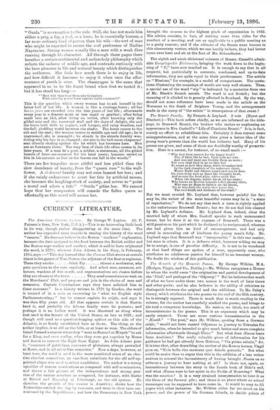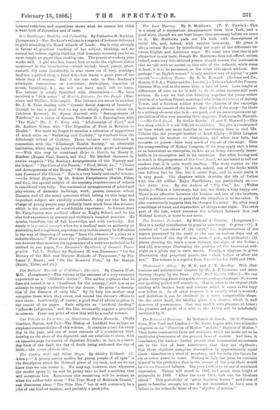The Growth of the Homeric Poems. By George Wilkins, M.A.
(Hodges, Figgie, and Co., Dublin.)—Mr. Wilkins recognises a Homer to whom the world owes " the origination and partial development of the ` Iliad,' and perhaps of the Odyssey. " But he believes that much of what we have under these two names is the work of later times and other poets; and he also believes in the ability of criticism to distinguish between the original and the additions. To Mr. Paley's theory, which attributes the two poems to the end of the fifth century, he is strongly opposed. There is much that is worth reading in the volume, for the author has carefully studied the poems, and brings to his task a competent knowledge. He makes, we think, too much of inconsistencies in the poems. This is an argument which may be easily retorted. There are some carious inconsistencies in the " ZEneid." " The poet," says Mr. Wilkins, quoting from a German critic, " would not have caused Odysseus to journey to Teiresias for information, when he intended to give much better and more complete information afterwards through Circe." But what does Laces learn from Anchises ? The really valuable piece of information for his guidance he had got already from Helenus, " Via prima salutis," &c. It is true that, after describing the review of the Roman heroes, Virgil goes on, "Erin belle viro memorat qua', deinde gerenda." But what could be easier than to argue that this is the addition of a late writer anxious to conceal the inconsistency of having brought Antos on so arduous a journey to hear nothing at all ? Is there not, again, an inconsistency between the story in the fourth book of Dido's end, and what .IEneas says to her spirit in the Fields of Mourning ? What was the aunttius ? It is a very strained interpretation to take it as the blaze of the funeral pile; and there is no place where an actual messenger can be supposed to have come in. It would be easy to fill pages with other instances. Mr. Wilkins relies far too much on his power, and the power of his German friends, to decide points of
internal critioism, and sometimes shows what we cannot but think a want both of discretion and of taste.



































 Previous page
Previous page